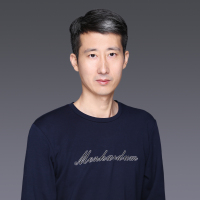
Dr. Zhanxiong Wu received his BS in Electron Information Technology and Instrument in 2006, and PhD in Control Theory and Engineering in 2009 from Zhejiang University. From Dec. 2017 to Dec. 2018, he worked as a visiting scholar at Biomedical Engineering, University of Houston. At present, he was on the faculty of Electron Information Institute at Hangzhou Dianzi University. Dr. He's research interests include neuroengineering, functional biomedical imaging, and biomedical instrumentation. He has published over 20 articles in peer-reviewed core international journals.
Some Publications
- Zhanxiong Wu, Xu Dong, Thoms Potter, Yingchun Zhang. Effects of Brain Parcellation on the Characterization of Topological Deterioration in Alzheimer's Disease. Frontiers in Aging Neuroscience. 2019, 11.
- Zhanxiong Wu, Thomas Potter, Dongnan Wu, Yingchun Zhang. Denoising High Angular Resolution Diffusion Imaging Data by Combining Singular Value Decomposition and Non-Local Means Filter. Journal of Neuroscience Methods. 2019, 312: 105-113.
- Zhanxiong Wu, Dongnan Wu, Dong Xu.White Matter Fiber Tractography Using Nonuniform Rational B-Splines Curve Fitting. Journal of Healthcare Engineering. 2018, DOI: 10.1155/2018/8643871.
- Zhanxiong Wu, Yang Liu, Ming Hong, Xiaohui Yu.A review of anisotropic conductivity models of brain white matter based on diffusion tensor imaging. Medical & Biological Engineering & Computing. 2018, 56: 1325-1332.
- Zhanxiong Wu, Xiaohui Yu, Yang Liu, Ming HongA PSO-Powell Hybrid Method to Extract Fiber Orientations from ODF. Computational and Mathematical Methods in Medicine. 2018, DOI: 10.1155/2018/7680164.
- National Natural Science Foundation of China, 51207038, Research on anisotropic conductivity of brain tissues based on diffusion tensor imaging, ¥250000, Jan.2013 - Dec. 2015;
- Zhejiang Natural Science Foundation, LQ12F01003, Anisotropic model of brain tissue conductivity based on DTI, ¥50000, Jan. 2012 - Dec. 2014;
- Zhejiang Natural Science Foundation, LY17E070007, Research on construction of brain structural connectivity networks based on Q-ball diffusion imaging, ¥80000, Jan. 2017 – Dec. 2019.
